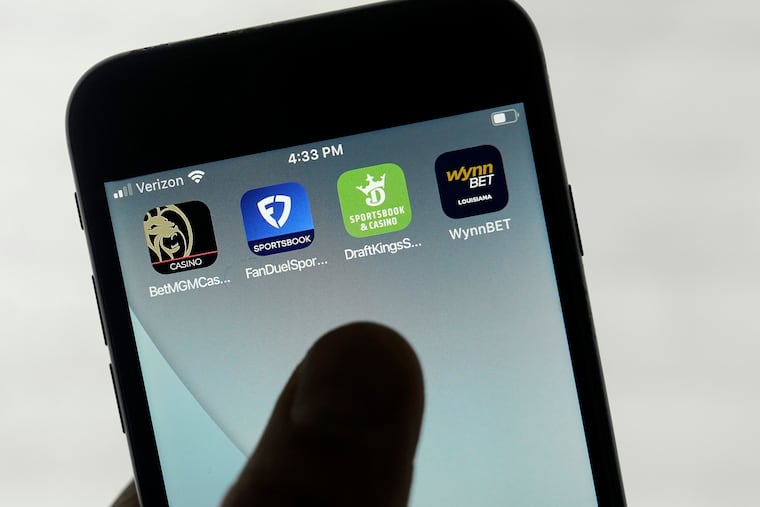Online gambling puts tech-savvy teens at risk
The prevalence and aggressive advertising by online gambling sites represent a new public health problem for Gen Z.

Americans are legally wagering more than $3 billion on this year’s NCAA basketball tournaments, according to estimates by the American Gaming Association. Much of that money will undoubtedly come from a wave of fresh-faced teen gamblers who will use any of the multiple online gaming sites to place their bets.
March Madness, indeed.
The prevalence and aggressive advertising practiced by these sites — which include DraftKings, FanDuel, BetMGM, PointsBet, and BetRivers — represent a new public health problem for Gen Z that demands action from lawmakers and law enforcement.
Since 2018, when the U.S. Supreme Court effectively legalized online gambling in the U.S., this kind of gaming has become a massive problem for young people under the legal age to place a wager, like me. Teenagers and young adults are more susceptible to online gambling addiction because our brains aren’t fully developed. And it’s not a small problem — 60% to 80% of high school students report having gambled for money even though laws restrict anyone under 21 from placing a bet.
While gambling as an addiction affects approximately 1% of adults, with 38 states (including Pennsylvania) allowing sports betting (29 states allow wagering online), this problem is poised to get worse as more states move to legalize this kind of gambling.
» READ MORE: Don’t gamble with kids? The state should heed its own advice. | Editorial
Aside from the age restrictions, states have developed creative and innovative ways to identify problem betting patterns, including mining data from apps to analyze it for problem patterns.
But bettors have figured out ways to circumvent that surveillance. A common way to backdoor the regulation is creating multiple user accounts, something simple for tech-savvy Zoomers.
By using different devices and IP addresses to avoid detection, someone can engage in what’s known as gnoming — generating multiple accounts with the same bookmaker to circumvent maximum bet limitations, or even pretend to be someone else. Strictly, gnoming isn’t outrightly illegal, so there’s little downside for a person with a gambling problem to try it.
Online gambling is inherently more problematic for young people than in-person betting — and not only because a teen walking into a casino would be easier to spot. Online betting is easier to hide, with family members unlikely to know what their loved ones are doing at their computer or on their phones, and for kids wagering in a digital space, the money spent may not feel real. At least not in the same way repeated trips to an ATM would.
And since technology is advancing to help the bettor gamble more often, and stoking the feeling of “smart bets” — there are now tip apps that provide information on trends, particularly in college basketball, that assist with wagering decisions — we digital natives may be the most likely to become the new compulsive gamblers.
We’re also getting snookered.
Influencers like Adin Ross and Félix Lengyel, better known as xQc, have signed multimillion-dollar deals in exchange for gambling in front of their young followers, but they likely have no real skin in the game. Sponsors provide fake balances for many popular personalities to play with, creating artificial situations that have no risk. By acting out big wins on their channels, these streamers entice young audiences to join a gambling site through affiliate links and promo codes from which they make a commission.
As tempting as it may seem, the answer isn’t to shut down these betting venues or restrict young users’ access to the internet. Trying to drive betting underground may backfire, as history teaches us through Prohibition and the war on drugs. In our country’s current state of free speech absolutism, attempts to get influencers not to gamble fake money will only attract more attention, along with allegations of censorship.
Besides, betting is not an industry we can simply stop now that it’s been legalized. That horse has left the barn — and people are betting on it winning the Kentucky Derby.
Online sports betting was a $9.5 billion business in 2023; it generates revenue and jobs. Sports betting is expected to add between $11.6 billion and $14.2 billion to the country’s gross domestic product annually, depending on how widespread the legalization is and what the tax laws are like in those states. It would also generate 125,000 to 152,000 jobs paying an average of $48,000.
» READ MORE: Ban ‘skill games’ in Pennsylvania | Editorial
But increasing fines and fees associated with allowing teens to place bets might be effective. In Australia, a company was fined the equivalent of more than $230,000 for allowing one 17-year-old to bet. In Pennsylvania, the fine for three instances of underage casino gambling resulted in a $40,000 fine.
Higher fines for the industry may have companies implementing stricter protections, but a public health campaign that targets teens and separates the act of placing a bet from typical internet behavior is also needed.
Twenty years ago, researchers listed four public health strategies to address problem gambling among young people. They included protection, prevention, and harm reduction as ways to ameliorate teen gambling, but the most important strategy was denormalization, or basically adding a stigma to the act.
In the past, denormalization worked with smoking. It can work with gambling, too, but we haven’t prioritized this problem enough to try a sustained public education campaign. Any addiction tears families apart and can limit young people’s horizons. Failing to do more now will only allow this public health problem among young people to fester and grow along with us.
William Tang is a senior at Deerfield Academy.